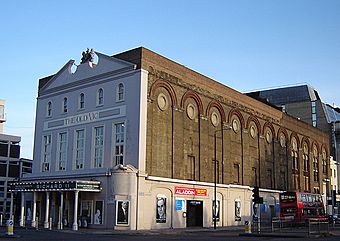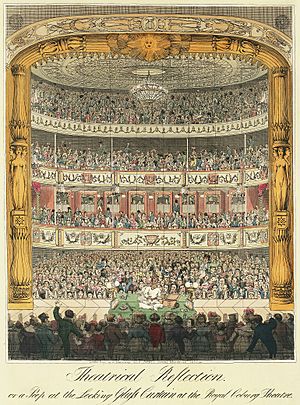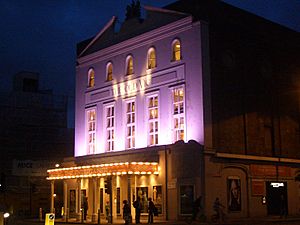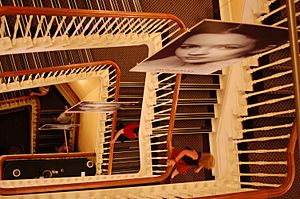The Old Vic facts for kids
|
Royal Coburg Theatre
Royal Victoria Theatre Royal Victoria Palace Royal Victoria Hall and Coffee Tavern |
|

The exterior of the Old Vic from the corner of Baylis Road and Waterloo Road
|
|
| Address | The Cut London, SE1 England |
|---|---|
| Coordinates | 51°30′08″N 0°06′35″W / 51.5022°N 0.1096°W |
| Public transit | |
| Owner | Old Vic Theatre Trust 2000 |
| Designation | Grade II* listed |
| Type | Non-commercial theatre |
| Capacity | 1,067 |
| Construction | |
| Opened | 1818 |
| Rebuilt | 1871: J. T. Robinson 1880/1902: Elijah Hoole 1922/1927: Matcham & Co.,(under F. G. M. Chancellor) 1933–38: F. Green & Co 1950: Pierre Sonrel 1960: Sean Kenny 1983: Renton, Howard, Wood & Levine |
| Years active | 1818–present |
| Architect | Rudolphe Cabanel of Aachen |
| Website | |
| oldvictheatre.com | |
The Old Vic is a famous theatre in Waterloo, London, England. It has about 1,000 seats and operates as a non-profit organization. This means it focuses on art and education, not just making money.
The theatre first opened in 1818 as the Royal Coburg Theatre. It changed its name to the Royal Victoria Theatre in 1833. After being rebuilt in 1871, it became the Royal Victoria Palace. In 1880, Emma Cons took over and renamed it the Royal Victoria Hall. But by then, everyone already called it the "Old Vic."
In 1898, Emma Cons's niece, Lilian Baylis, started managing the theatre. She began putting on plays by William Shakespeare in 1914. The building was damaged during air raids in 1940 but reopened in 1950. It became a special historic building in 1951.
The Old Vic has been a very important place for theatre in London. Many famous acting groups and theatres today have connections to the Old Vic. For example, the Royal National Theatre started here in 1963, led by the legendary actor Laurence Olivier. The National Theatre stayed at the Old Vic until its new building opened in 1976.
Later, the theatre was completely updated in 1985. From 2003 to 2015, the famous actor Kevin Spacey was the artistic director. He wanted to bring new energy to British theatre. Since 2015, Matthew Warchus has been the artistic director.
Contents
The Old Vic's Story
How the Theatre Began
The Old Vic was started in 1818 by James King, Daniel Dunn, and John Thomas Serres. They got permission from Princess Charlotte and Prince Leopold to name it the Royal Coburg Theatre.
At first, the theatre was not allowed to show serious plays. But in 1824, George Bolwell Davidge brought the famous actor Edmund Kean to perform six Shakespeare plays. This helped the theatre become known for bringing great art to many people.
In 1833, the theatre was bought by Daniel Egerton and William Abbot. They changed its name to the Royal Victoria Theatre. This was to honor Princess Victoria, who was 14 years old and would later become Queen Victoria. She visited the theatre only once, but she enjoyed the show.
In 1841, David Osbaldiston took over. The theatre continued to show exciting melodramas. In 1858, a sad event happened when an actor's clothes caught fire, causing a panic.
Later, in 1871, the theatre was rebuilt and reopened as the Royal Victoria Palace. But this new venture did not last long.
Emma Cons and the Royal Victoria Hall
In 1880, Emma Cons took charge of the theatre. She changed its name to the Royal Victoria Hall and Coffee Tavern. She wanted it to be a place for learning and entertainment without alcohol. People already called it the "Old Vic" by this time.
Lectures given at the hall led to the creation of Morley College. This college for working men and women shared the building for a while. Lectures were even held backstage! The college later moved to its own building nearby.
In 1923, the theatre made history. It was part of a very early radio broadcast of an opera called La Traviata. The BBC broadcast it live from the theatre.
The Old Vic Company
When Emma Cons passed away in 1912, her niece Lilian Baylis took over. Lilian focused on performing plays by William Shakespeare. The Old Vic Company was officially formed in 1929, with Sir John Gielgud as a key leader.
Lilian Baylis also helped rebuild the Sadler's Wells Theatre between 1925 and 1931. She created a ballet company there. For a few years, the drama and ballet companies performed at both theatres. The ballet company later stayed at Sadler's Wells permanently.
During Wartime
The Old Vic theatre was badly damaged during World War II. The acting company had to tour around the country from 1940 to 1943. In 1944, the company returned to London. Famous actors like Ralph Richardson and Laurence Olivier were its stars. They performed at the New Theatre until the Old Vic could reopen in 1950. A branch of the company, the Bristol Old Vic, was also started in Bristol in 1946.
The Five-Year Plan
In 1953, Michael Benthall became the Artistic Director. He created a "Five Year Plan." The goal was to perform all of Shakespeare's plays from his First Folio over five years. This plan started with Hamlet, starring Richard Burton and Claire Bloom. It ended with Hamlet again, starring John Neville and Judi Dench. Michael Benthall stayed with the Old Vic until 1962.
Home of the National Theatre
In 1963, the Old Vic company changed. The new Royal National Theatre Company, led by Sir Laurence Olivier, made the Old Vic its home. They stayed there until their own new building opened on the South Bank in 1976.
In 1974, the Old Vic hosted its first rock concert. The band Gryphon performed music they had created for a production of Shakespeare's The Tempest.
Prospect Theatre Company
After the National Theatre moved out, the Prospect Theatre Company became the resident company at the Old Vic. They put on very successful plays, including Hamlet with Derek Jacobi. In 1978, the Old Vic agreed to a five-year contract with Prospect.
However, Prospect faced challenges because their funding was mainly for touring, not for performing in London. This made it hard to pay for shows at the Old Vic. In 1980, Timothy West took over as artistic director. The company performed a final season in 1981 before it stopped operating.
Youth Theatre
The Old Vic also had a 'Youth Theatre' group for young people aged 12 to 20. Most of the members were from the London area of Southwark. This group was started in 1977.
The young actors held auditions and then performed plays. Their first play was 'The Kitchen' by Arnold Wesker. They also performed A Midsummer Night’s Dream by William Shakespeare at the Old Vic itself. The Youth Theatre continued to put on plays until the mid-1980s.
Reopening and New Ownership
The Old Vic theatre was greatly restored in 1985 by a Canadian businessman named 'Honest Ed' Mirvish. His son, David Mirvish, brought in Jonathan Miller as artistic director in 1987. The theatre had some successful shows, but it also lost money.
In 1997, Sir Peter Hall became artistic director. Again, there were critically praised shows, but also financial losses. In 1998, the Old Vic was put up for sale. A new charitable group, the Old Vic Theatre Trust 2000, bought the building.
Kevin Spacey's Time
In 2003, the actor Kevin Spacey became the new artistic director of the Old Vic Theatre Company. He wanted to bring both British and American acting talent to the stage. Spacey was the artistic director until 2015.
In 2018, the Old Vic started the Guardians Programme. This program helps staff share any concerns they have about behavior or the work culture in a safe and private way.
Matthew Warchus and Bicentenary
Since 2015, Matthew Warchus has been the Artistic Director of The Old Vic. His first season opened in September 2015 with a new play called Future Conditional.
The Old Vic celebrated its 200th birthday on May 11, 2018. They had a special free performance of a play called Mood Music to mark the occasion.
Recent Productions
The Old Vic continues to stage a wide variety of plays and musicals. Here are some examples of the types of shows that have been performed:
- Plays by famous writers like William Shakespeare (e.g., Richard III, Much Ado About Nothing), Arthur Miller (e.g., The Crucible, All My Sons), and Harold Pinter (e.g., The Caretaker).
- Musicals like High Society and Groundhog Day.
- New and exciting plays, including Future Conditional and Mood Music.
- Special online performances during the COVID-19 pandemic, such as Lungs and A Christmas Carol.
The theatre often features well-known actors and directors, bringing many different stories to life on its stage.
 | Isaac Myers |
 | D. Hamilton Jackson |
 | A. Philip Randolph |




